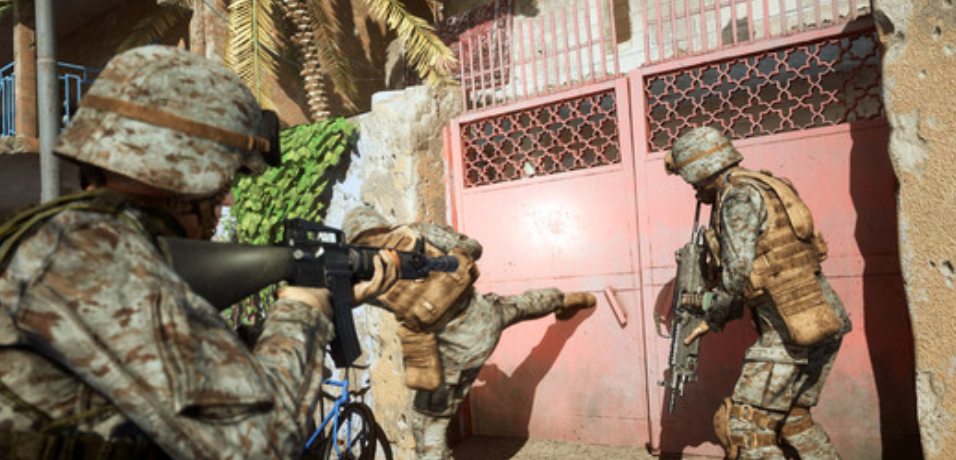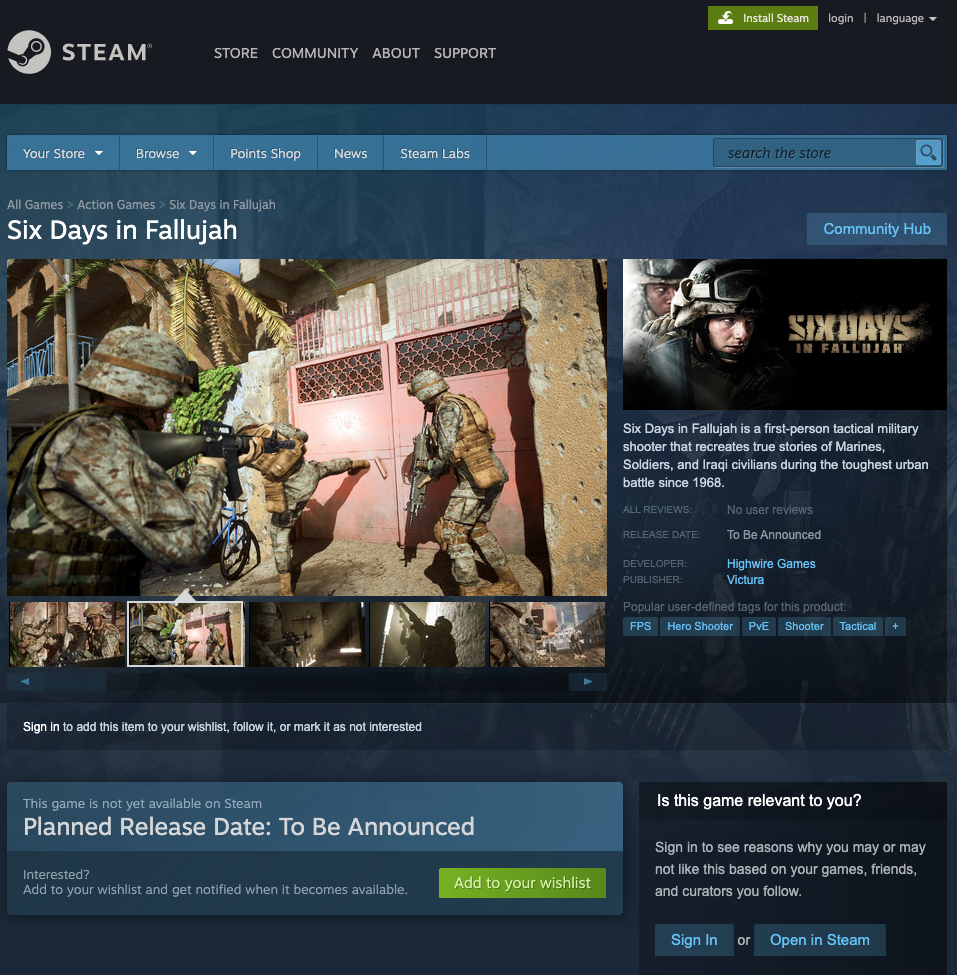The hammer of social justice is coming down on a video game, Six Days in Fallujah.
By all appearances, this is yet another Iraq War FPS, of the sort that I have never been even a little bit interested in. I don’t really play any kind of FPS, unless I’m really into the story, in which case, I put difficulty to the lowest setting.
But with this game, the media is really coming down hard on it, and though I probably will not bother to play the game, I’m going to preorder it to show solidarity with the devs.
The leftish gaming blog Game Pressure outlines the current situation with the game, and those attacking it:
The controversy surrounding Six Days in Fallujah emerged right after the announcement of the resuming of work on the game. It was not helped by the narration of the creators, who first claimed that they preferred to avoid any difficult topics, but then completely changed their minds. Subsequent announcements, including the first gameplay trailer, only added fuel to the fire. Some players, developers and journalists began to loudly demand the game’s cancelation. Among those who signed the petition was Osama Dorias, the main designer of the upcoming Gotham Knights.
People who oppose the release of the game do not like the narrative shaped by the creators.Six Days in Fallujah is a game which focuses primarily on the fate of American marines engaged in military operations in Iraq. The form of the game is to be partly documentary in nature. The game will be accompanied by the statements of American soldiers who were eyewitnesses of the events. At the same time, the fragments of interviews that appeared in the game’s trailer completely ignore the question of civilian experience in Fallujah. Some of the claims made there also turned out to be shocking for some internet users. Particularly negatively received were the words of one of the marines describing the clearing of houses. He said that the actions of the person who first enters a building should always be considered appropriate, as he is under a great deal of stress. Some have taken this as justification for random killings of civilians.
Rami Ismail, a developer of Iraqi descent, also drew attention to the way the experiences of the Americans were portrayed in contrast to those of the local population. He acknowledged that the game portrays soldiers as the most affected. They are the ones who have to face fear as well as death. However, the theme of civilian casualties was not emphasized in any way. The only moment in which the theme of local people was shown was when they were accused of not escaping from the war-torn city. According to Rami, this can be described as blaming the victims and dehumanizing the Iraqis.
According to many, the subject matter of the game has been handled in a bad way, not only by narrating it from the American perspective, but also by omitting important facts. Six Days in Fallujah is a game that focuses on the subject of a war that many consider illegal or at least unjustified. Furthermore, the Second Battle of Fallujah is an episode of the Iraq War that is simply incomplete to discuss without mentioning civilians. The fighting in the city caused great controversy due to the approximately 800 casualties among ordinary citizens, the footage of American soldiers killing wounded combatants, and the use of illegal weapons such as incendiary and depleted uranium projectiles. However, the developers have revealed that they do not intend to refer to these events. As stated by the CEO of the game’s publisher Victura, Peter Tamte: “I don’t want the search for sensationalism to distract from the main experience the game is supposed to bring.”
The devs are not under any requirement whatsoever to include any form of content that they don’t want to include in their game.
I think the Fallujah battle probably was more than a little bit immoral, like the entire Iraq War was, but if these devs want to focus on the experience of the US soldiers – who were not morally culpable for this war – then that is fully within their rights. No one anywhere has a right to tell them what they should put in their game, least of all this whiny haji faggot:
https://twitter.com/tha_rami/status/1374448997876736011?ref_src=twsrc%5Etfw%7Ctwcamp%5Etweetembed%7Ctwterm%5E1374448997876736011%7Ctwgr%5E%7Ctwcon%5Es1_&ref_url=https%3A%2F%2Fwww.gamepressure.com%2Fnewsroom%2Fsix-days-in-fallujah-online-petition-wants-the-game-canceled%2Fz02ff2
Kotaku is also moving into action against the game.
You Don’t Have To Run The Exclusive Reveal For The War Crime Game https://t.co/b9CmXNaav5 pic.twitter.com/r1kMPYVl3T
— Kotaku (@Kotaku) March 24, 2021
The change.org petition against the game claims that the game will create mass shooters, which is a really retro attack on a video game.
Right now, the game is not available for pre-order on Steam yet.
I would advise the devs to get pre-order up as quickly as possible, because I know for a fact that I’m not the only one who wants to buy this game in order to show support for freedom of expression in gaming.
Video games are the single place that we still have some form of freedom of expression, and if these people are successful in shutting down this game, then they are going to start coming for other games, immediately, for all sorts of different reasons.
As a side note, procedurally generated FPS maps are a creative innovation, and some haji dismissing that as “we’re so replaceable, we’re a rougelike now” is disgusting.
The whiny haji is free to make a game where you play as an Iraqi civilian being really scared of invading troops. That is his freedom. He doesn’t have the freedom to shut down other people’s games.
Highwire needs to turn on pre-order now, because there are a lot of people who want to shill this.

